How 46 of the 50 constituencies of England with the worst Covid vaccine uptake are LABOUR
- EXCLUSIVE: NHS England figures show 66.8% of over-65s in Birmingham Ladywood have received a first jab
- 47 of the top 50 constituencies in England for vaccine uptake among over-65s are Conservative strongholds
- Experts say Tory areas tend to have richer populations and uptake has been higher among wealthy people
Nearly all of the fifty constituencies in England that are lagging behind in the Covid vaccine roll-out are Labour, MailOnline can reveal.
NHS England figures show just 66.83 per cent of over-65s living in Birmingham‘s Ladywood area had received their first dose by February 28.
It was followed by Camberwell and Peckham (67.43 per cent) and Westminister North (68.74 per cent) in London, where uptake is known to be lagging behind the rest of the country. The constituencies have been held by Labour since at least 2010 and one has been red since the 1970s.
The data analysed by MailOnline shows 47 of the 50 constituencies with the highest uptakes are Tory. The roll-out needs to achieve even coverage around the country to ditch draconian lockdown restrictions over the coming months.
Scientists say Tory-voting areas tend to be wealthier — with uptake higher among richer groups — and have fewer ethnic minorities, which may be boosting the rollout’s performance. Health officials are concerned about high levels of vaccine hesitancy among BAME groups, fuelled by anti-vaxx messages on social media.
Labour MPs today claimed their areas have missed out on the Government’s £23million Community Champions Fund, which was aimed to boost vaccine uptake among the most vulnerable and ethnic minorities. Just £2.1million (eight per cent) of the scheme has been spent in London, which is largely Labour, even though the capital is home to around 15 per cent of England’s population.
Eight of the ten constituencies where uptake is lowest across the country claim not to have received any funding from the scheme at all. But the Government claims funds have been fairly distributed based on a variety of factors, including Covid infection rates and levels of ill health.
England’s Covid vaccine roll-out was officially widened to over-55s this week, and GPs have been told to prepare to receive up to 10 million extra vaccine doses within days following a surge in supply.
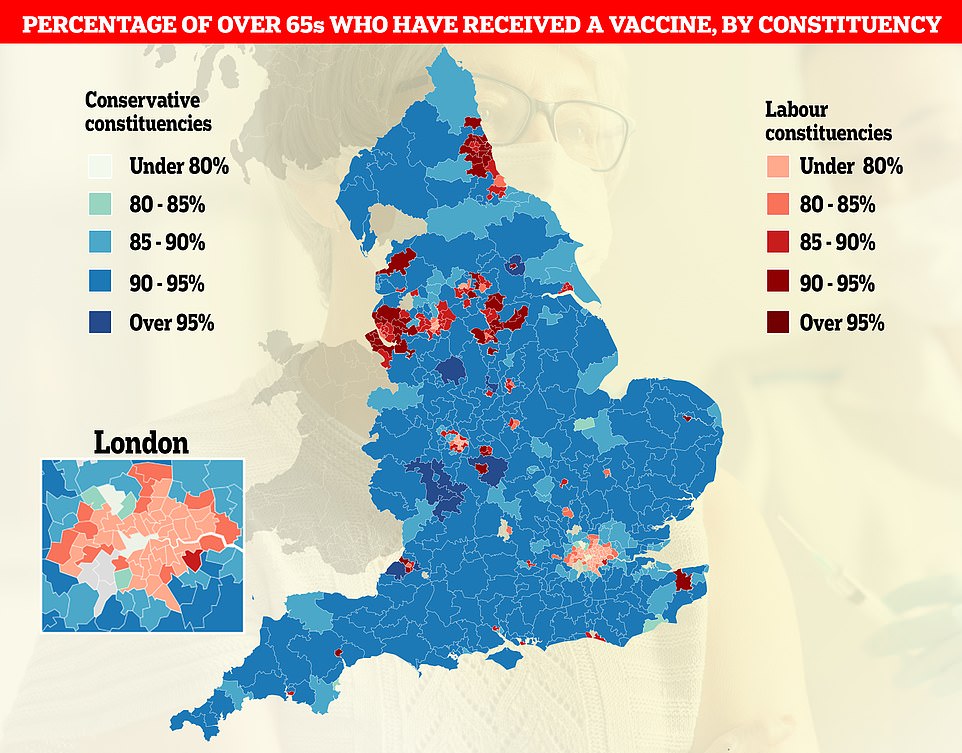
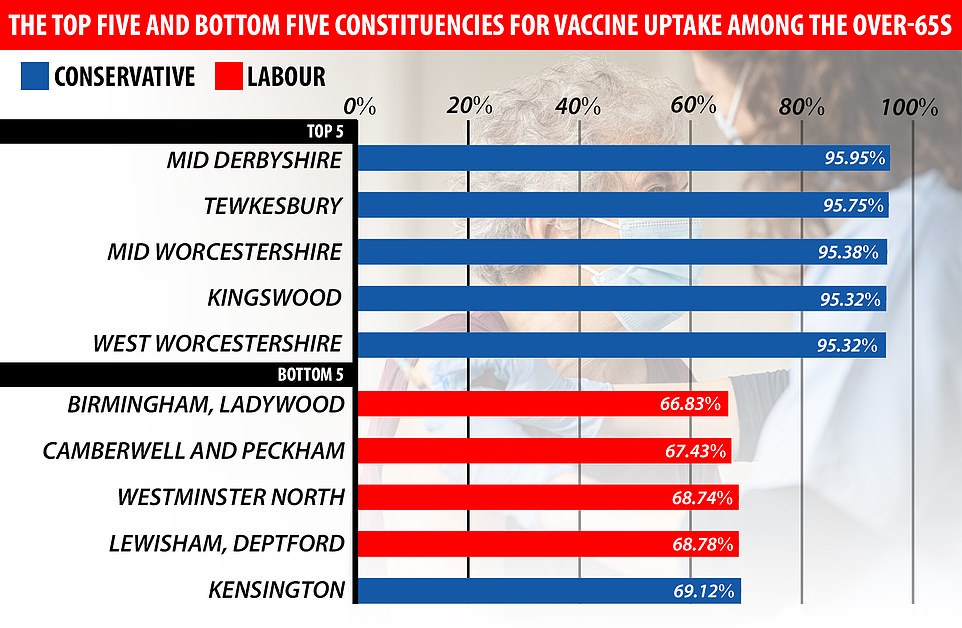
NHS England figures show just 66.83 per cent of over-65s living in Birmingham’s Ladywood area had received their first dose by February 28. It was followed by Camberwell and Peckham (67.43 per cent) and Westminister North (68.74 per cent) in London
NHS bosses have called for local vaccination teams to stamp down on ineligible people being invited for vaccines, after reports of healthy twenty-somethings being called up for their jabs and people skipping queues by claiming to be carers.
The NHS data shows that forty-six of the fifty constituencies with the worst vaccine uptakes were Labour, with the lowest ten all in London — other than Birmingham’s Ladywood, in which 73 per cent of residents are from BAME backgrounds, according to the 2011 Census.
Only three areas in the country have higher rates of ethnic minorities than Birmingham Ladywood, and one was also in the ten constituencies where uptake was lowest. The others, East Ham and Ilford South, had below average uptakes of 72 per cent and 78 per cent.
Two of the London constituencies were Tory — Kensington and the Cities of London and Westminster, which both saw uptakes of 69.1 per cent among over-65s.
The rest were Labour: Lewisham (68.8 per cent), Tottenham (69.2 per cent), Vauxhall (69.3 per cent), Brent Central (69.5 per cent) and Croydon North (69.8 per cent).
At the other end of spectrum, all ten of the best performing constituencies were Conservative strongholds, with Mid Derbyshire ranking top.
The Midlands constituency had vaccinated 19,827 of its 25,532 over-65s by February 28, with an uptake of around 96.0 per cent.
MP for Mid-Derbyshire Pauline Latham told MailOnline: ‘I thank all of the medical staff and volunteers involved for a fantastic job in rolling out the vaccinations in Mid Derbyshire and beyond.
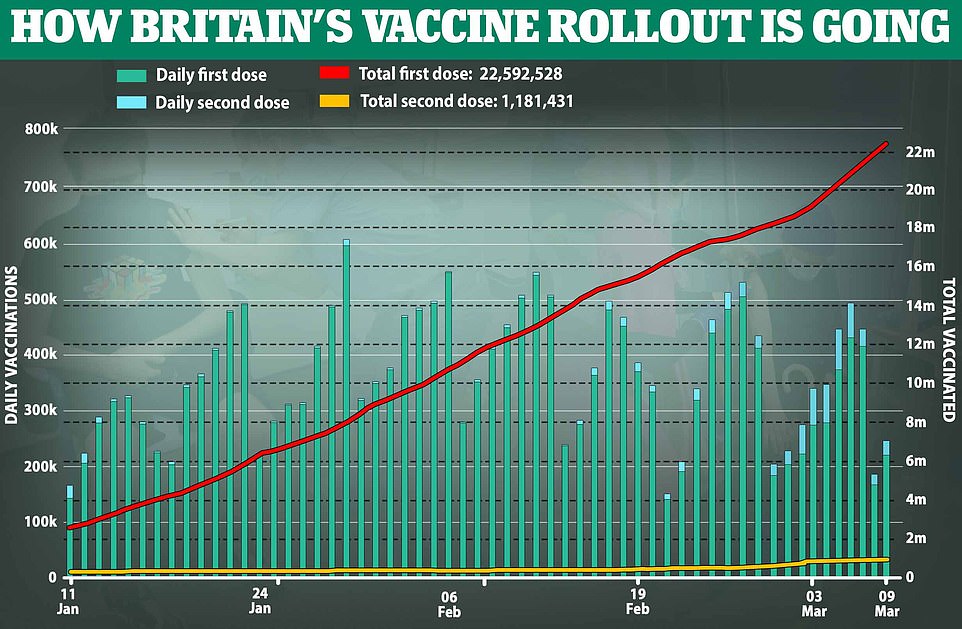
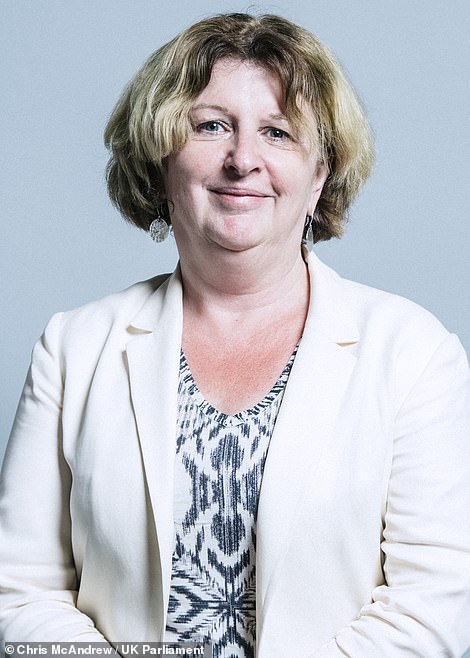
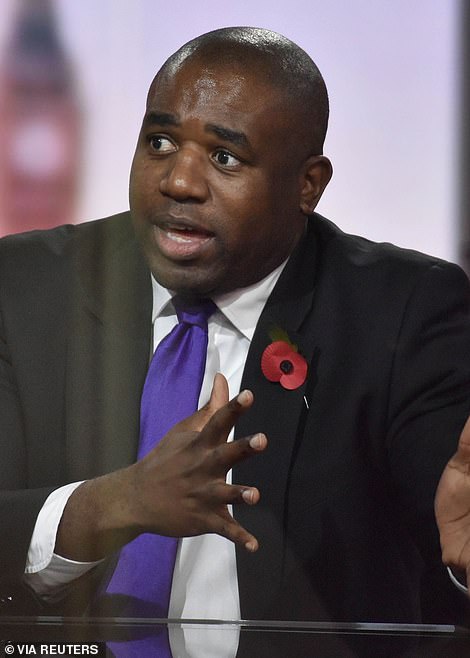
Karen Buck (left), MP for Westminster North, where vaccine uptake is the third lowest in the country, raised concerns that the vaccine coverage gap could widen further as the rollout moves down age groups if issues of reluctance are not solved. Shadow Justice Secretary and MP for Tottenham, where vaccine uptake is the seventh lowest in the country, David Lammy (right) encouraged his constituents in the JCVI-determined priority groups to take up the offer of the vaccine.
‘I have witnessed their dedication in letting people know of their appointments and then the caring and efficient way the injections are administered.
‘It is pleasing that the majority of my constituents understand how important vaccinations are in getting the country back on to its feet.
‘Meanwhile, I would appeal to those who are in the priority groups and haven’t had their jab to do so as soon as possible.’
After Mid-Derbyshire came Tewkesbury in Gloucestershire (95.8 per cent) and Mid Worcestershire (95.4 per cent).
They were followed by: Kingswood in Avon, West Worcestershire, North Somerset, York Outer (all 95.3 per cent), Staffordshire Moorlands, Kenilworth and Southam in Warwickshire (both 95.1 per cent) and Rutland and Melton in Leicestershire (95.0 per cent). All ten had BAME populations of less than five per cent.
MailOnline’s analysis shows there was a six percentage point difference between uptake rates in the richest and poorest constituencies of the country.
Using the Government’s most recent deprivation statistics — which take into account incomes, education, health, employment, crime and more — each constituency was ranked in terms of how deprived they were.
The top 20 per cent most deprived areas saw an average of 86.5 per cent of over-65s vaccinated. Meanwhile, the figure was 92.6 per cent in the least deprived areas.
These figures partly explain the success in uptake in Conservative areas, which tend to be more wealthy and score lower on the Index of Deprivation.
Dr Simon Clarke, associate professor in cellular microbiology at the University of Reading, said the relative wealth of Tory areas, as well as their lower proportion of BAME residents, were the two most likely reasons for their success in rolling out the vaccine.
He told MailOnline: ‘Areas with Conservative MPs generally tend to have wealthier populations with a higher age demographic, even amongst those aged over 65.
‘Older people with the highest risks of developing severe Covid-19 are likely to be the most enthusiastic recipients of the vaccines and there is good evidence that uptake is higher in people with higher socioeconomic status.
‘These areas are also have fewer BAME residents, where there is increasing evidence of vaccine hesitancy.
‘In the absence of any evidence of vaccine shortages in areas that do not vote Conservative, health authorities and policymakers would be best advised to tackle the reasons for this apparent reluctance to accept potentially life-saving vaccination in these groups who are at relatively high risk.’
Labour MPs today highlighted the role of faith leaders and community groups in reducing vaccine hesitancy in at-risk groups and said some areas had missed out on a Government grant to help promote vaccine uptake.
Karen Buck, MP for Westminster North, where vaccine uptake is the third lowest in the country, raised concerns that the vaccine coverage gap could widen further as the roll-out moves down age groups if issues of reluctance are not solved.
She told MailOnline that while some of the variance in uptake might be explained by issues with population data and people not living in inner-city areas during lockdown, deprivation and hesitancy remained issues that need to ‘be better understood’.
And she added that little of No10’s £23million Community Champions scheme — which aims to support those most at risk from Covid and boost vaccine take up — went to inner city areas in London.
Just £2.1million of the scheme has been spent in London, with money only going to the boroughs of Greenwich, Hackney, Haringey, Harrow, Hillingdon and Lewisham.
Ms Buck said: ‘I am doing what I can directly, with the local NHS and council to encourage people to have the vaccine when offered and to answer questions that may arise but I am absolutely convinced that the answer in respect of overcoming vaccine hesitancy lies with peer-to-peer messaging and community role models.
‘The role played by faith leaders and community groups is critical and deserves all our support.
‘I was sorry that we didn’t receive any of the government grant for this purpose recently precisely because we are clearly trailing in the league table, and it was not at all clear how those resources were allocated.
‘It is not unreasonable to fear that the coverage gap may widen further as vaccination rolls down the age bands, so we do need to focus all our attention on getting this resolved.
‘In the interests of the well-being of our most vulnerable residents, wider public health and our ability to get society and the economy fully functioning, we need every area to be at the level of the best.’
The Ministry of Housing, Communities and Local Government told MailOnline the scheme used Public Health England data to produce a targeted list of councils based on a variety of factors, including infection rate, levels of disability and social integration.
A Government spokesperson said: ‘The Community Champions scheme is one way we are working with councils, faith leaders, grassroots community organisations, and charities to protect our communities from coronavirus and get vaccines to as many people as possible.
‘The additional funding for this scheme is targeted at areas with the most people at greater risk from Covid, such as older people, disabled people, and people from ethnic minority backgrounds.’
Shadow Justice Secretary and MP for Tottenham, where vaccine uptake is the seventh lowest in the country, David Lammy encouraged his constituents in the JCVI-determined priority groups to take up the offer of the vaccine.
He told MailOnline: ‘In January I took my 81-year-old Aunt Mayfield to get the vaccine in Tottenham.
‘She was hesitant at first, but very pleased in the end to get her first dose. The vaccine is safe, it works and it will save thousands of lives.’
And Lewisham, Deptford’s MP Vicky Foxcroft, where just 68.8 per cent of over-65s have received a jab, told MailOnline: ‘I would urge anyone who is eligible for the vaccine to take up the offer as soon as possible.
‘As someone who has been shielding on and off since March last year, I’m very glad to have had mine.’
Alex Norris, Shadow Minister of State for Public Health and Patient Safety, said: ‘We know Covid has exacerbated existing health inequalities and the vaccine uptake is no different.
‘It is vital that as supply increases and more people get ready for their second doses that ministers put in extra effort to catch up in communities where uptake has fallen behind.’
